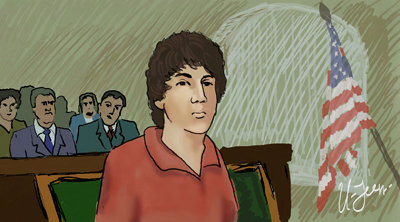MOSCOW, February 20 (RAPSI, Ingrid Burke) – Complaining of “FBI monitoring” and efforts by prison staff to screen certain defense materials, attorneys for Boston Marathon bombing suspect Dzhokhar Tsarnaev has urged the US federal court adjudicating his case to vacate all special restrictions imposed against their client in a heavily redacted motion filed Thursday.
US Attorney General Eric Holder issued a memo August 27 imposing against Tsarnaev a variety of restrictions referred to as Special Administrative Measures (SAMs).
Among the restrictions imposed against Tsarnaev were several targeting his interactions with the defense team, and several targeting his communications with others. This latter category includes, among other things, restrictions on group prayer and on non-legal communications with individuals outside of his immediate family.
Tsarnaev’s defense team filed a motion to vacate the SAMs in October, challenging the “extraordinary and severe restrictions,” on various bases. The motion asserted that the SAMs were detrimental to the defense team’s capacity to adequately represent their client, noting: “Among other things, the SAMs limit Mr. Tsarnaev’s interactions with individuals assisting defense counsel and restrict the communications and other activities of the defense team in furtherance of the defense.”
The motion is still pending, though prosecutors lifted certain of the restrictions in November, expanding both the list of individuals that are entitled to disseminate the contents of Tsarnaev’s communication to third parties, and the list of pre-cleared individuals permitted to meet with the defendant unaccompanied.
Thursday’s motion states that the remaining SAMs continue to significantly impact its work, stating: “the defense is encountering obstacles related to FBI monitoring [redacted] and [Federal Bureau of Prisons (BOP)] screening of materials that defense counsel need to review with the defendant. These obstacles thwart preparation of imported parts of the defense case in mitigation and also threaten the integrity of attorney work product.”
An entire two-page section of the motion entitled “FBI Monitoring” was redacted.
With regard to BOP screening, the defense team complained of an incident in January where BOP staff sought to review the contents of certain digital material that counsel had brought in for Tsarnaev’s review. After refusing the screening, the counsel was unable to share the material with Tsarnaev, and have refrained from attempting to bring such materials since that time, complaining that BOP staff members inquire about the presence of digital media each time they visit.
The motion asserts, “government knowledge of materials that the defense has selected to review with the defendant would undermine the integrity of attorney work product,” and urges the court to order the government to employ a neutral, independent party to review controversial material.
On the afternoon of April 15, two explosions occurred near the finish line of the Boston Marathon. IEDs devised from pressure cookers, low explosive powder, shrapnel, adhesive, and other materials were hidden in backpacks that were then placed near metal barricades in areas packed with hundreds of spectators.
According to a related indictment, “Each explosion killed at least one person, maimed, burned and wounded scores of others, and damaged public and private property, including the streets, sidewalk, barriers, and property owned by people and businesses in the locations where the explosions occurred.”
The three individuals killed during the bombing were Krystle Marie Campbell, Lingzi Lu, and eight-year-old Martin Richard.
Tsarnaev was arrested following a dramatic manhunt, the events of which killed his brother and co-suspect Tamerlan, and claimed the life of an MIT Police Officer Sean Collier. He was charged in a criminal complaint dated April 21 with the use of a weapon of mass destruction and malicious destruction of property resulting in death.
Then on June 27, a federal grand jury returned a 30-count indictment against Dhzokhar, charging him with a plethora of charges related to the bombings and the MIT officer’s death.
According to the prosecution notice filed Thursday, counts one through ten and twelve through eighteen “are such that, in the event of a conviction, a sentence of death is justified.” The counts referenced in the memo include: the use of a weapon of mass destruction resulting in death (two counts), the bombing of a public place resulting in death (two counts), the malicious destruction of property resulting in injury and death (two counts), the possession and use of a firearm resulting in death (nine counts), and two counts of conspiracy.
At an arraignment hearing on July 10, Dzhokhar pleaded not guilty to all charges pending against him.
US prosecutors filed their notice of intent to pursue the death penalty against Tsarnaev on January 30.
In addition to asserting various statutory threshold findings that they argue justify the decision to pursue the death penalty against Tsarnaev, prosecutors advanced a variety of aggravating factors contributing to the decision, ranging from the vulnerability of the Boston Marathon bombing’s youngest victim, to Tsarnaev’s apparent lack of remorse.



